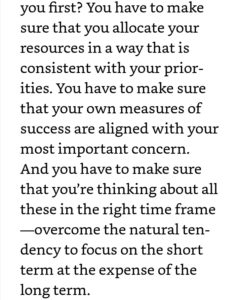How will you measure your life is the title of Clayton Magleby Christensen most recent book. It seems that this book is the last one since he died on 23th January this year. Ex Harvard teacher assembles like in a puzzle his business knowledge with ethical and life principles in order to feel accomplished about what had done with our lives.
Satisfaction, equilibrium, great relationships and good health are things we all want in our lives, but many of us are successful in one field and fail in another one or discover their true vocation too late or „burry” their health due to burnout, bad decisions on other life pillers etc.
How will you measure your life is a truly simple guide to complacency and a happy life mainly because of simple, concise but powerful questions for each field of life.
How will you measure your – Professional life?
If you want to have a happy life on profession side, you should ask yourself a few things before choosing career path:
1.What is most important for you in your career? PRIORITIES
Are the „hygiene factors” as per Herzberg’s theory (related to external motivation given by money, work conditions, position in a company) or intrinsic motivators like recognition, self responsibility, personal growth, challenging work etc?
If you are focused on intrinsic ones, your chances to find your true vocation and have a happier life are much bigger because at the end what truly matters is „your journey”, not the destination.
2. What drives your professional decisions? STRATEGY
Clayton provides examples from his own life using two business concepts: deliberate and emergent strategies. The first one is related to planning your career, knowing step by step what to do next for accomplishing your dreams. Emergent strategy is when you refer to opportunities and know to adapt to them, to use in your self interest.
Given his own career path, Clayton considers that emergent strategy is best when you want to explore your skills and find your true vocation and deliberate when you are already on a steady professional track. But also reminds us that we need to keep going open minded to other opportunities. Somehow his career is a combination between these two strategies, but the key is to have a satisfactory response, irrespective of the chosen strategy, to these questions:
- Is your work meaningful to you?
- Does your job offer you a chance to develop your skills, to enhance your personal abilities?
-
Will you learn new things in your job?
3. What are the assumptions that have to prove right for these projections to work and how will you track them?
This question seems to me the central key for every decision in our lives. Because of uncertainty, complex human behaviour, very fast changes, we might take in account assumptions which do not fit after a short period of time with our initial planning and thinking. Clayton gives a few examples from Aeronautics industry, who had some discrepancies between assumptions and final results.
That’s why he also gives a kind of solution for this: rank after importance and uncertainty your assumptions and ask yourself which of them are under your control.
4. How do you implement your strategy? RESOURCES
One strategy, either for personal life or for career is composed of every single day multiple decisions about how we spend our time, our money, our energy!

For me this was a great revelation, I understood that I am more focused on career than personal life, I invest a lot of time in keeping myself updated with technical tools and technology software.
Also, from my point of view, you can have a look to your monthly calendar, what kind of meetings, what kind of tasks or hobbies does this include? Is your time used according to your desires?
Do this exercise and you will be amazed to find out more values about you than what you thought or what you stated to others that were. Plus your mindset will change too and realise where you need to concentrate your efforts more than you used to do.
Till part 2 of How will you measure your life, you might read: How to win friends and influence people?



It seems to be an interesting book.
[…] Sa fim mai chibzuiți cu banii, timpul, viețile noastre […]
[…] Citeste si: Cum iti vei masura viata […]